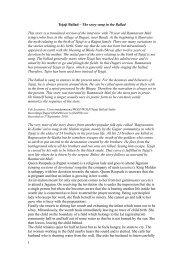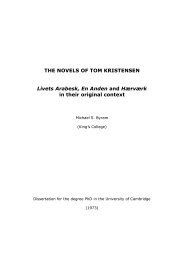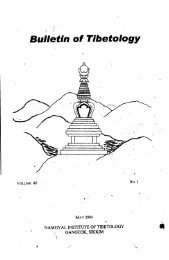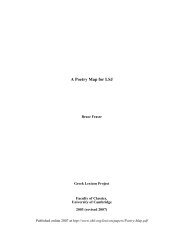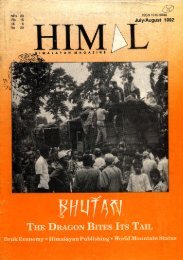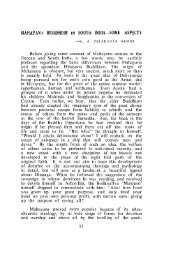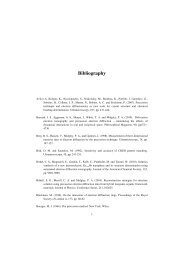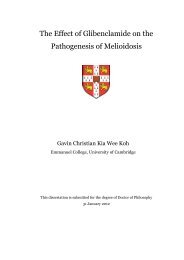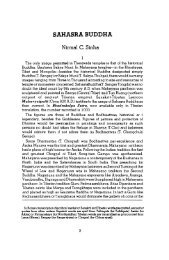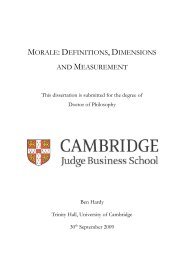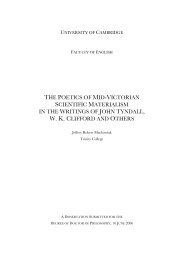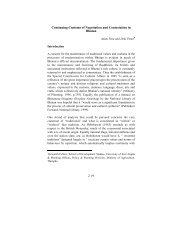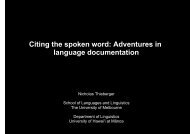The Crusades, the Genoese and the Latin East - DSpace at ...
The Crusades, the Genoese and the Latin East - DSpace at ...
The Crusades, the Genoese and the Latin East - DSpace at ...
Create successful ePaper yourself
Turn your PDF publications into a flip-book with our unique Google optimized e-Paper software.
was Guglielmo's inexperience th<strong>at</strong> motiv<strong>at</strong>ed his partners in <strong>the</strong>ir instructions. Comparing <strong>the</strong><br />
above case to o<strong>the</strong>r contracts made with merchants in <strong>the</strong> process of training, it can be inferred<br />
th<strong>at</strong> Guglielmo was in fact given here wider responsibilities than was typical of his age.<br />
Inexperienced merchants were usually sent along with o<strong>the</strong>r merchants, more experienced ones.<br />
For example, in 1186 Simon Bonithome was given explicit instructions from Ugo Embriaco.<br />
Simon was instructed to travel to Ceuta first <strong>and</strong> <strong>the</strong>n continue to Alex<strong>and</strong>ria. From Alex<strong>and</strong>ria he<br />
had to return to Ceuta, but only if Oglerio Agoxino or Guglielmo Bonithome undertook this<br />
voyage. O<strong>the</strong>rwise, Simon was allowed to travel from Ceuta with one of <strong>the</strong> above mentioned<br />
experienced merchants to a third destin<strong>at</strong>ion <strong>and</strong> <strong>the</strong>n return to Genoa. Altern<strong>at</strong>ively, he could<br />
return from Alex<strong>and</strong>ria to Genoa, with no fur<strong>the</strong>r changes of <strong>the</strong> journey. 178<br />
Ano<strong>the</strong>r merchant in<br />
training was Obertino, nephew of Guglielmo Bonithome. Guglielmo registered a commenda<br />
contract with Obertino's mo<strong>the</strong>r, in which <strong>the</strong>y agreed th<strong>at</strong> Obertino must travel with his uncle to<br />
Ceuta <strong>and</strong> negoti<strong>at</strong>e with <strong>the</strong> money his mo<strong>the</strong>r had invested. From Ceuta only Guglielmo had <strong>the</strong><br />
right to decide where to travel next. 179<br />
In 1203 Guglielmo B<strong>at</strong>ifoglio was twenty-years old,<br />
however, he was sent on a long distance route to <strong>the</strong> <strong>L<strong>at</strong>in</strong> <strong>East</strong> with <strong>the</strong> permission to decide how<br />
to proceed <strong>the</strong>nce. Moreover, he was not <strong>at</strong>tached to ano<strong>the</strong>r merchant or required to sail on a<br />
particular ship. <strong>The</strong> only indic<strong>at</strong>ion th<strong>at</strong> he was inexperienced was in <strong>the</strong> restricted destin<strong>at</strong>ions in<br />
his contract. It is not clear, however, why Guglielmo was not allowed to travel to Sicily. Vivaldo<br />
from Rapallo was ano<strong>the</strong>r merchant who was asked in <strong>the</strong> same year not to travel to Sicily. O<strong>the</strong>r<br />
rare cases of prohibitions are found on travels to Apulia <strong>and</strong> Malta. <strong>The</strong> most likely reason for<br />
<strong>the</strong>se prohibitions is th<strong>at</strong> <strong>the</strong> residing merchants wished to direct <strong>the</strong> travelling merchants to <strong>the</strong><br />
markets where <strong>the</strong> merch<strong>and</strong>ise on board could be sold in <strong>the</strong> most profitable way <strong>and</strong> o<strong>the</strong>r<br />
goods purchased with <strong>the</strong> proceeds of <strong>the</strong> sales. <strong>The</strong>re might have been political reasons for <strong>the</strong>se<br />
prohibitions too, but <strong>the</strong> small number of cases does not allow one to draw more specific<br />
conclusions. 180 <strong>The</strong> series of cases presented above shows th<strong>at</strong> restrictions could have been a<br />
<strong>the</strong> l<strong>at</strong>est, although it is in Asia Minor <strong>and</strong> not exactly in wh<strong>at</strong> is generally considered as Ultramare. David<br />
Abulafia suggested to read stallum as 'place' or'harbour' perhaps deriving from 'stabulum. I would like to<br />
thank Professor Jacoby <strong>and</strong> Professor Abulafia for <strong>the</strong>se comments.<br />
178<br />
Porto Setam causa merc<strong>and</strong>i et inde Alex<strong>and</strong>riam et de Alex<strong>and</strong>ria Setam, si Oglerius aguxinus vel<br />
Guilielmus i3onithome hoc fecerint viagium et si hoc non fecerint, de Seta in unum iter quod ipsefecerit vel<br />
alter illorum me reverso de Alex<strong>and</strong>ria non mut<strong>at</strong>o alio itinere... ' OS, 1186, no. 136.<br />
19 OS2 1186, no. 190, from 22 October 1186<br />
180 With regard to Apulia see document GG, no. 779; on Malta GG, no. 793 (rel<strong>at</strong>ed to <strong>the</strong>se are GG, nos.<br />
773 <strong>and</strong> 788). In his article on Henry Count of Malta, David Abulafia suggested a few reasons for <strong>the</strong><br />
prohibition on Malta: it 'may have implied th<strong>at</strong> Malta was not yet a safe haven, ei<strong>the</strong>r because of Henry's<br />
rapacity ... or because control of Malta was still in dispute' altern<strong>at</strong>ively, Abulafia suggested th<strong>at</strong> it was<br />
because '<strong>the</strong>re was no market for cloth in Malta'. David Abulafia, 'Henry, count of Malta <strong>and</strong> his<br />
Mediterranean activities: 1203-1230', in Anthony T. Luttrell, ed., Studies on Malta before <strong>the</strong> Knights<br />
(London, 1975), p. 107.<br />
61



